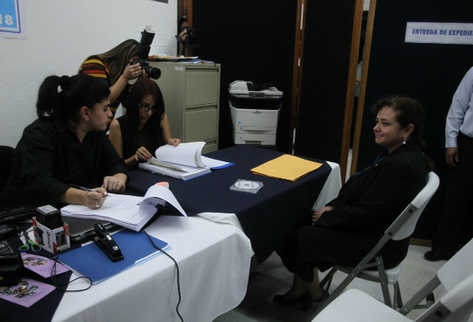Treinta personas presentaron su expediente a la Comisión de Postulación del Ministerio Público, entre ellas la actual Fiscal General, Claudia Paz y Paz.

Eunice Mendizábal, Baudilio Portillo Merlos, Rony López, Edgar Enrique Lemus Orellana, Luis Arturo Archila Álvarez, Danilo Roca, Cecilia Ilusión Barrios Ortega, Thelma Aldana, Moises Galindo, Óscar Contreras, Leopoldo Liu, Anabella de León y Marco Antonio Villeda presentaron su expediente esta mañana.
Otros candidatos son Jorge Luis Donado Vivar, Silvia Jeaneth García Guzmán, Julio Rivera Clavería y Edgar Antonio Abel López Sosa, quienes presentaron su documentación ayer.
La comisión tiene a su cargo definir a seis postulantes para que el presidente de la República haga la elección. Su decisión deberá ser avalada por el Congreso.
Los integrantes de la postuladora se comprometieron a entregar la nómina a más tardar el 2 de mayo.
Paz y Paz
Asumió el cargo en diciembre de 2010.
Durante 2012 la fiscal fue incluida en la lista de la revista Forbes de lasmujeres más poderos que están cambiando el mundo en Política y Políticas Públicas.
La revista resaltó que desde que Paz y Paz asumió el cargo en el año 2010, ha trabajado arduamente por aplicar la justicia contra el crimen organizado, violaciones a los derechos humanos y quienes son responsables de la violencia de género.
También fue postulada para el Nobel de la Paz 2013, por el desempeño del Ministerio Público durante el desarrollo del juicio por genocidio, entre los sindicados está el exjefe de Estado, Efraín Ríos Montt.
Mendizábal
Actualmente se desempeña como la Quinta Viceministra de Gobernación, encargada al combate al narcotráfico.
Fue titular de Fiscalía Especial para la Comisión Internacional Contra la Impunidad en Guatemala (Cicig).
Portillo Merlos
Fue titular de la Procuraduría General de la Nación entre abril de 2008 a agosto de 2009.
Se desempeñó como director de la Policía Nacional Civil (PNC) en los primeros días del gobierno de Alfonso Portillo.
Se desempeñó como asesor legal de la Secretaría General de la Presidencia.
Fue juez de Primera Instancia y presidente del Tribunal Tercero de Sentencia.
Rony López
Es el Fiscal Contra la Corrupción, trabaja en el Ministerio Público desde hace 18 años.
Lemus Orellana
Es abogado y notario, ha participado en el Consejo del Ministerio Público.
Trabajó en la Oficina de Derechos Humanos del Arzobispado y fue docente de la Universidad de San Carlos.
Archila Álvarez
Es jefe de la Fiscalía Metropolitana.
Roca
Trabaja como embajador de la Fundación de Esquipulas.
Barrios Ortega
Es fiscal de la Unidad de Extinción de Dominio.
Contreras
Trabaja en la Contraloría General de Cuentas.
Aldana
Inició como conserje del Juzgado de Familia de Quetzaltenango en 1981, oficial y notificadora de la misma sala.
En 1999 fue electa Magistrado Titular de la Corte de Apelaciones, habiendo ejercido como presidenta del Tribunal de Conflictos de Jurisdicción.
En 2011 fue designada como Presidenta de la Corte Suprema de Justicia.
Galindo
Es abogado, ha representado a varios personales polémicos como Efraín Ríos Montt, Byron Lima Oliva, entre otros.
Liu
Es exfiscal contra el Lavado de Dinero
Villeda
Es juez de Extinción de Dominio.
De León
Ejerció como diputada entre 1996 al 2011
Actualmente se desempeña como registradora General de la Propiedad.
Otros aspirantes
Aura Marina López Cifuentes, Amílcar Enrique Colíndres Hernández, Marco Antonio Cortez, William René Méndez, Ronald Federico Urrutia, Francisco Quiñonez, Erick Fernando Rosales, María Consuelo Porras, Acisclo Valladares, Ingrid Liseth Caracuz, Jaime Fernando Osorio Alonzo y Mamfredo Gallo.
*Con información de Hugo Alvarado
POR PRENSA LIBRE.COM
03:18 p.m.
Fuente: Yahoo
